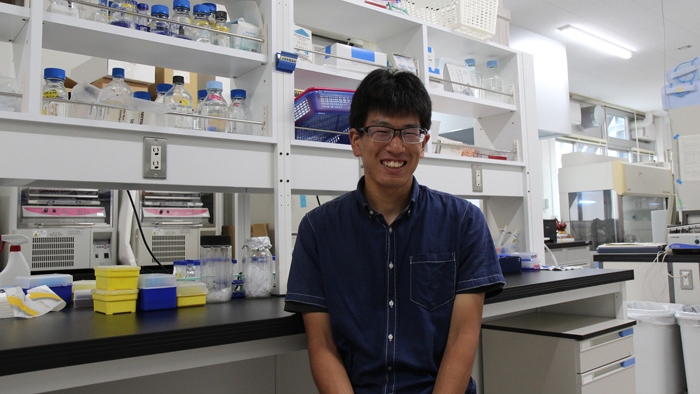
6th Year, School of Pharmaceutical Sciences
Ryohei Ogino
<Graduated from Hyogo Prefectural Seiryo High School>
“HU Student Voices” gives our prospective students an insight into the perspectives of HU students. As the 25th interview in this series, we talked to Ryohei Ogino, 6th year student in the School of Pharmaceutical Sciences.
Mr. Ogino is studying hard for the Pharmacist National Examination, whilst diligently practicing for his track and field team. We have interviewed him about his fulfilling everyday life, his preparation for university exams, and his classes at Hiroshima University.
Why did you choose Hiroshima University?
One of my decisive factors was because of my center test’s scores. After knowing the results of my center test, I chose Hiroshima University because more score weighting was allocated to the secondary exam. Also, Hiroshima University was relatively close to my hometown, Hyogo prefecture.
What was the reason why you decided to pursue in Pharmaceutical Sciences?
I decided I wanted to study in Pharmaceutical Sciences on my third year of junior high school. At that time, I was interested in the field of social welfare or medicine because my parents worked in that field. I thought I would be compatible with pharmacy because I could utilize my strong point; chemistry, and also work in the medical field, so I started to shoot for that. Since I was a child, I disliked medicine because I wasn’t good at swallowing them. I wanted to find a solution to that, and help people out.
In the School of Pharmaceutical Sciences there are two programs; Program of Pharmaceutical Sciences and Program of Medicinal Sciences, but tell us the reason why you chose Program of Pharmaceutical Sciences that raises pharmacists instead of scientists or technicians.
I admired researchers, but I thought there would be a broader choice if I had a pharmacist license, so I chose the Program of Pharmaceutical Sciences.
When did you begin preparation for exams?
I began after I retired my club, from July of my third year in high school. I continued to play in track and field competitions until September, but I started studying consciously in July.
Were you attending a cram school or study school?
No, I did not attend a cram school nor study school, and studied in the study room at high school or at home. I am the type who cannot remember just by writing. There were a lot of times I would read aloud to memorize. When there are people around, I couldn’t read aloud, so I would study most of the time at home.
What was the hard thing about the preparation for exams?
There wasn’t a lot of times I felt studying was hard, because my attitude was “Work hard when you need to, rest when you need to”. However, before the center test, there were times where I was mentally unstable; I couldn’t eat, or I would get stomachaches. I was surprised myself, and I felt depressed. My mother would listen to me vent, which helped me overcome that.
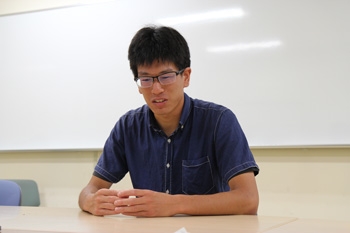
Mr. Ogino reflecting on his days when he was preparing for the entrance exams
After actually entering, how was Hiroshima University?
Hiroshima University is an integrated university. In 3 campuses 11 schools are gathered, so there are many students. The great part of Hiroshima University is that the School of Medicine, Dentistry, and Pharmacy are all gathered, so even in the Kasumi campus, there are opportunities to get to know many different types of people. Furthermore, there are lots of chances to get to know students from different schools in activities outside of school, such as in circles.
What kind of research are you doing currently?
I am researching in the field of food allergies at Professor Hiroaki Matsuo’s Department of Pharmaceutical Services. In the laboratory, relationship between students and the teacher is very close, and it has a very happy atmosphere. Hiroshima University’s Program of Pharmaceutical Sciences is quite small, where there are only about 60 students in one grade, so in each lab there are only about 2-5 students. Because there are not too many students, it is easy to communicate with one another. When there are times where my experiments are not going well, it is easy to consult to people, so I feel I am very lucky.
Duration of the Program of Pharmaceutical Sciences is 6 years. Please tell us about the 6 years in this program.
The first grade classes are mostly liberal arts. You will take liberal arts classes except for English. During my time I mostly took classes at the Higashi-Hiroshima campus, but from this year, all classes will be held at the Higashi-Senda campus in general, but half of the 2nd and 3rd term will be held in the Higashi-Hiroshima campus.
From the first half of your 2nd year, your specialized subject classes will begin. Classes are only held until noon, but the content was difficult to me, so there were a lot of hard times.
In the last half of your 2nd year and 1st half of your 3rd year, there will be classes until noon, and basic training classes in the afternoon. In the basic training classes you will learn how to write reports, and basic experimental strategies.
In the last half of your 3rd year, you will be put into a lab, and you will begin your research for your bachelor’s thesis. There will be times where there are no classes. On the days where there are no classes, you will learn the basics of research at your lab, or you will research on the topics given by your teacher.
On your 4th year, there will be less classes. You will study for the “Pharmaceutical Common Achievement Tests (PhCAT)”, that is conducted in schools of pharmacy nationwide. On the PhCAT, there is an exam called OSCE that tests your hand-on skills and attitudes, and an exam called CBT that tests your knowledge level. You must pass the PhCAT or you are unable to go to pharmaceutical practical training. It is a busy time, because you have to study for that test, and work for your bachelor’s thesis at the same time.
On your 5th year, there are pharmaceutical practical trainings held for 11 weeks at hospitals and pharmacies. You must finish this training, or else you are unable to take the Pharmacist National Examination. During the training at the pharmacy, the supervisor pharmacist helped me out a lot. He was very passionate, and slowly walked me through everything. During the training I had to turn in a report everyday. My supervisor pharmacist always left a long message on the report.
Now, in my 6th year, my main job is to research for my Bachelor’s thesis and study for my Pharmacist National Examination. The Program of Pharmaceutical Sciences students will present their thesis research on December, and the National Examination is in the end of February or beginning of March. After the presentation of my thesis, I am planning to cram my studying for the National Examination.
Currently, what kind of preparation are you doing for your National Examination?
The Pharmacist National Examination’s policy is that if you are unable to get a 65% or more, you will not pass. The test consists of essential problems, pharmaceutical theory problems, and pharmaceutical practical use problems, and if you are unable to get over 70% in the essential problems area, no matter how good you do in the other types of problems, you will not pass. It is really hard.
Currently I am studying with a practice book called “Aohon”. Aohon has a total of 10 volumes, and has about 7000 pages. You must remember 7000 pages of things such as “how medicines connect to receptors, and what reaction does it create”, or “what type of disease can you think of when you see these kinds of symptoms.”
Although it is a lot more developed than physics, chemistry and biology that you learn in high school, there are some that are connected, so I believe it is important to know the basics. I believe knowing the basics well will become a big strength in the future.
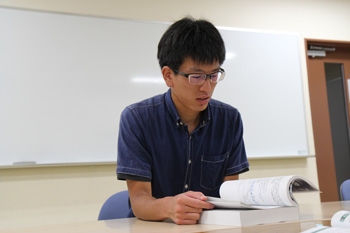
Mr. Ogino speaking about the countermeasures in the National Examination holding the “Aohon”
What were some of the most aspiring training and events?
One of them is the “Early exposure practice joint with School of Medicine” which is held in summer of your 1st year. Students in both Schools of Pharmaceutical Sciences and Medicine will be divided into the same groups as in the previously held Orientation Camp. Each group will visit a hospital or rehabilitation center and learn about what kind of jobs they do. I was able to think about a detailed image of what the team of medicine actually does at a very early stage.
Also, “Patient Orientated Camp Study Session” was impressive. This is a 2-days-program held in summer of your 3rd year, and there is a chance to directly meet with people who have experienced drug injury. You will gather the differences between what you have studied before, and what you heard from these victims. Our team’s theme was “labor-induction drugs”, but there was a lot of differences, and it became a precious learning experience.
Furthermore, School of Pharmaceutical Sciences send students to American universities every year. On the other hand, we accept international students, and so I helped international students just a little. I was very nervous to talk to foreigners.
Are you in a club?
I am doing track. Normally I play at the Kasumi campus’s track team, and on Saturdays I practice at the Higashi-Hiroshima campus. At the “All Japan Pharmaceutical Students Track and Field Competition”, I won 1st place in the men’s high jump, long jump, and triple jump both last year and this year; I won 1st place for high jump 3 years in a row.
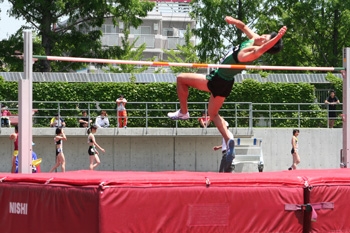
A scene from the club’s competition
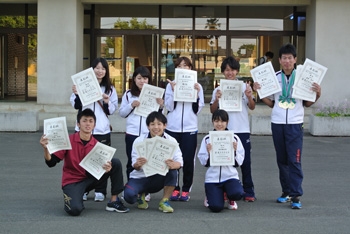
A gathered picture at the “Japan Pharmaceutical Students Track and Field Competition”
Please tell us your future dream!
I am planning to become a researcher from next year, and continue research for another 4 years, but I am still thinking about whether I want to continue researching or not, or become a pharmacist. The world of research is attractive, but I also have a dream to “become a pharmacist who can give back to the community.”
Currently, the topic of “Regular Pharmacist Policy” has become well spoken. This policy is when the patients themselves can choose a trustable pharmacist, understand what kind of medicine they are taking, and are able to get accurate advice when something happens. If I choose to pursue my life as a pharmacist, I want to become a pharmacist who can cope with this policy well, and give back to the community.
Lastly, give us a message for students who are thinking about entering Hiroshima University!
I believe Hiroshima University’s entrance exam relies more on basic knowledge rather than tricky problems. It is important to solidify basic knowledge. Although it may seem like the problem is tricky, it is just there are many “mountains” of problems holding together to check your understanding of basics. If you can solidify the basics one by one, the answer will come to you.
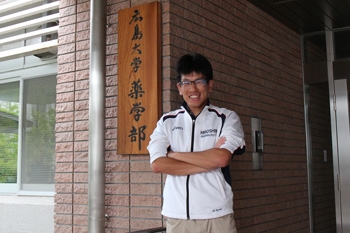
June 21, 2016
Report: Public Relations Group (G, F)
Photograph: Public Relations Group (F)
Location: School of Dentistry School Tutorial Room,
School of Pharmaceutical Sciences Experiment Room


 Home
Home





